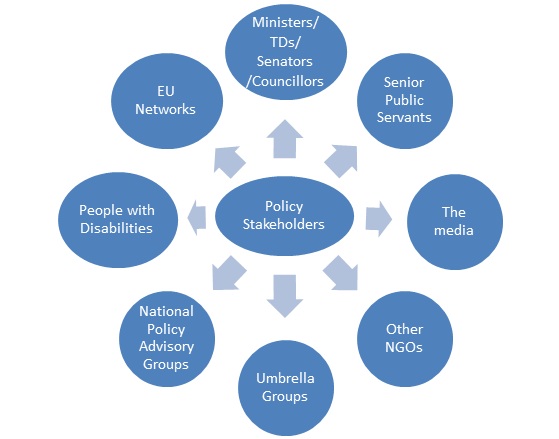Social Policy Analysis and Campaigning
Issued on June 12 2012
A Support to DFI Member Organisations
Why is social policy and campaign work relevant to disability organisations?
The National Disability Strategy (NDS) sets out a new vision for people with disabilities in Ireland and a clear commitment to mainstreaming. This presents new opportunities as well as challenges, particularly in the current economic climate.
The Government has acknowledged the great value of the experience and knowledge held by disability organisations. Participation by these disability organisations in the process of securing the implementation of the NDS is critical, given their extensive understanding of disability issues and their role as service providers.
All disability organisations have a role to play in influencing other organisations, sectors and agencies, beyond the disability specific arena, to make sure that services are available to people with disabilities. In addition, organisations can play an active part in influencing policy at government level that will impact on people with disabilities.
In the new social policy environment organisations need to:
- Be fully familiar and up to date with the needs of people with disabilities.
- Be in a position to work with other organisations and agencies to plan and co-ordinate the delivery of services.
- Monitor not only their own service delivery to those they represent, but also that of statutory and other community and voluntary organisations.
- Communicate to policy makers and others ‘good practice’ and what works.
- Record information on deficits in service provision and work towards having these deficits met.
How can disability organisations be more effective in their social policy analysis and campaign work?
- Capture gaps in policy and feed these into the correct fora.
- Write policy position papers on issues that impact on people with disabilities.
- Make submissions to relevant government departments and statutory agencies
- Write a Budget Submission and drive an effective Budget campaign.
- Keep up-to-date on key developments in policy.
What are the simple steps to doing social policy analysis and building your Campaign?
.jpg)
Step 1: Acknowledge the value in doing social policy analysis
As representatives working in the disability sector, either advocating for or providing direct services to people with disabilities, you will come across recurring barriers or gaps in services that need to be captured and addressed. This differs from personal advocacy, which is about helping an individual access their personal entitlements. In this step the organisation recognises the need for social policy analysis, and is committed to doing it. It forms part of their strategy to addressing problems that are created by inequalities that are experienced by people with disabilities, and/or the political and social infrastructure in which services operate.
Step 2: Identify key policy personnel and decision makers to target
The chart below demonstrates some of the key policy personnel and decision makers that you should consider linking in with to progress your campaign issues.

Step 3: Build and implement a strategy to influence change
Identifying the relevant policy stakeholders is only one aspect of building a successful Strategy to address gaps in policy.
You should also:
Decide who you need to talk to in order to collect information about re-occurring problems and gaps in services.
- People with disabilities, families and carers; workers such as family support or community workers; peer support groups; and other not for profit or representative groups.
Decide how you will capture this information and the processes to be introduced across the organisation to achieve this.
- A simple Excel spreadsheet or more advanced database, surveys and case study research, social policy committees.
Decide what means you will use to convey your message and lobby for change.
- Policy submissions and position papers, press releases and media campaigns, presentations, research and targeted networking and lobbying.
Step 4: Communicate campaign issues at every opportunity
Once you have identified the main gaps in policy, and have an established position, you will need to communicate this at every opportunity. Use different avenues to put your issues on the agenda, such as Joint Oireachtas Committees, relevant Department Consultative Forums, the Budget, and regional and local networks. Consider how to engage with the media to communicate a campaign issue.
Step 5: Continuously review campaign issues and update them if necessary
It is important to continuously review the campaign issues to take account in policy changes introduced by the Budget, or as a result of lobbying. New problems or barriers will also arise and they will need to be considered on an ongoing basis. The review part of social policy analysis is important in any person centered organisation.
What services can DFI offer to support your policy and campaign work?
DFI has developed a number of supports to help you in your policy and campaign work. They include:
- Practical advice on writing policy position papers and submissions.
- Information on new developments in social policy.
- Help with responding to calls for submissions.
- Provide an understanding of key disability specific developments as a consequence of the National Disability Strategy and Towards 2016.
- Provide an understanding of ‘Mainstreaming’ in the context of obligations on public bodies and Sectoral Plan commitments.
- Describe the monitoring infrastructure in place for implementing Government policy on disability.
- Support with pre-budget campaign
The DFI Social Policy and Campaigning Workshop
The Policy and Campaigning Workshop is a practical workshop for supporting organisations to plan and run a campaign. The training is designed to be interactive, to guide participants through the policy making process and the fundamentals of running a successful campaign. The workshop also supports organisations to get up-to-date with key national policies, and includes a review of the DFI Guide to Government Policy on Disability [1] .
At the workshop, participants can choose between different working groups that will deal with writing an internal policy statement from scratch, writing a policy submission to another body, based on their own policy positions, and making a pre-budget submission. The facilitator will spend some time on each topic to give advice or help if it is needed.
The workshop will to be delivered in DFI, starting at 10.00 a.m. and finishing at 4.00 pm. To make the most out of the event, organisations should take the time to ensure that the most appropriate person in the organisation is the one who attends the training. Learning by doing is a very reliable method for ensuring competency, accuracy and confidence.
To prepare for the training workshop please complete the pre-learning questionnaire, to be found on www.disability-federation.ie or from your Support Officer.
It is also helpful if the person attending the workshop has read the DFI Guide to Government Policy on Disability www.disability-federation.ie . The workshop is held at regular intervals and below is a sample session plan with the type of topics and that will be covered on the day.
DFI Social Policy and Campaigning Workshop – Sample Session Plan | |||
Date: See the DFI website | Time: 10 a.m. to 4 pm. | Venue: DFI | |
Objectives of the workshop:
| |||
Social Policy and Campaigning Workshop Sample Agenda | |||
10.00 -11.00 a.m.
| Explaining the Policy Making Process: Presentations and Discussion
| ||
11.00 – 11.15 a.m. | Break | ||
11.15 – 1.00 p.m. | A look at relevant policy and legislation
Working group session e.g.
| ||
1.00 – 2.00 p.m. | Lunch | ||
2.00 – 2.45 p.m. | Campaigning & Lobbying – what does that mean?
| ||
2.45 – 3.00 p.m. | Break | ||
3.00 – 4.00 p.m. | Working group session e.g.
Evaluation of the day | ||
Help DFI with its lobby and campaign work
Your organisations, and the people with disabilities whom you represent, have essential experience and inside knowledge of the issues that impact on their lives. We would like to hear about them, in order to strengthen our campaign work and help get their voices heard. To help us to do this and to find out how you can get involved, contact your DFI Support Officer.
Contact information
For information and contact details for the DFI Support Officer in your area please contact DFI Head Office at 01-454 7978 or look at our website www.disability-federation.ie .
[1] Disability Federation of Ireland (2008) ‘Guide to Government Policy on Disability for Voluntary Disability Organisations’, www.disability-federation.ie .

